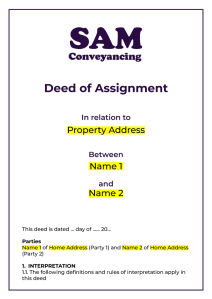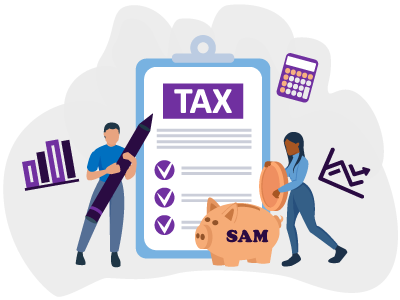Capital Gains Tax for Married Couples
- Transferring property between spouses/civil partners is generally exempt from Capital Gains Tax (CGT) due to the "no gain no loss rule" .
- A higher rate tax-paying spouse can assign their share of the property to the spouse/civil partner in a lower tax bracket to reduce their CGT liability.
- A separate CGT Property Return must be filed by each spouse/civil partner within 60 days of completion (if CGT is due).
- No CGT return is needed if there is no gain on the transfer (for UK residents).
- The CGT rate is determined at the exchange of contracts, not on completion.
- Ownership shares between couples can be adjusted until completion by filing a Form 17 with HMRC.
Capital Gains Tax (CGT) is payable on profits made from selling assets, including properties that are not your main residence (Principal Private Residence or PPR).
This typically includes buy-to-lets, second homes, and inherited properties. Your CGT rate depends on your income tax band, and everyone has an annual tax-free allowance (£3,000 per tax year).
Married couples and civil partners have the unique opportunity to minimise their Capital Gains Tax liability by transferring ownership of a property between each other. This means that a lower-income earner can own more of the property and utilise their tax-free CGT allowance so they're taxed at a lower rate on any gains.
CGT reliefs on property transferred to a spouse
When a property is transferred between spouses or civil partners, it's generally treated as a "no gain, no loss" or "zero consideration" transaction, meaning that no Capital Gains Tax is payable at the time of transfer. This is due to the Taxation of Chargeable Gains Act 1992:
This rule means that the receiving spouse/civil partner inherits the original cost basis of the property, allowing couples to strategically plan their tax liability when they eventually sell the property, as they can then utilise both of their CGT allowances.
For disposals to anyone other than your married partner, read Capital Gains Tax when gifting to your child.
Our solicitors can draft your Deed of Assignment within 1 to 2 working days.
- Assign any amount of beneficial interest from 1% to 100% between the legal and non-legal owners.
- Change the beneficial interest at a future date for Capital Gains Tax purposes.
- For tenants in common.
- Does not assign debts or outgoings.

£275 INC VAT
What is the current rate of Capital Gains Tax?
| Tax Band | Income Tax Band | Capital Gains Tax Rate (chargeable on profits) |
| Basic rate income tax payer | £0 to £50,270 | 18% |
| Higher rate income tax payer | Over £50,271 | 24% (post 6th March 2024 budget) |
Can married couples share capital gains allowance?
Yes, married couples or civil partners can share their capital gains allowance by transferring property ownership. This is usually used when one spouse or civil partner is in a lower-income tax bracket.
How do you transfer your property to your spouse?
Contact us online for assistance with drafting deeds and severing a joint tenancy to distribute capital gains.
Draft a Deed of Assignment
This legally transfers a portion of the beneficial ownership of the property to your spouse/civil partner without needing to change the legal title.
This allows you to split the capital gain percentage in any way (50-50, 99-1, etc.) to take advantage of both tax-free allowances.
File a Form 17 (optional)
While not strictly required when the property isn't jointly owned, filing a Form 17 can provide HMRC with a clear record of the ownership split with a signed, witnessed, and dated deed.
Sell the property
Remember that the CGT rate is determined at the exchange of contracts, not completion. Be careful around the government's budget announcements as rates may go up or down.
File Capital Gains Tax return
Each spouse/civil partner must file a separate return and pay the tax liability within 60 days of completion. You can file a return online on the government website.
Sever the joint tenancy and register as tenants in common
If you own the property as joint tenants (meaning you equally share any gain), you'll need to sever the joint tenancy to become tenants in common, allowing for unequal ownership shares.
Draft a Deed of Assignment
This document will outline the agreed-upon ownership percentages without changing the property's title. This allows you to split the capital gain percentage in any way (50-50, 99-1, etc.) to take advantage of both tax-free allowances.
File a Form 17
This is required if you are not splitting the ownership 50/50. It informs HMRC of the actual ownership percentages.
Sell the property
The CGT rate is determined at the exchange of contracts. Be careful around the government's budget announcements as rates may go up or down.
File Capital Gains Tax return
Each spouse/civil partner must file a separate return and pay the tax liability within 60 days of completion. You can file a return online on the government website.
Share rental income or transfer property ownership quickly and easily with a Deed of Assignment.
Get your first draft within 1-2 working days*.
Our experienced solicitors draft deeds for various purposes, from buy-to-let transfers to protecting your interest in the family home.
- Transfer rental income efficiently.
- Assign Capital Gains securely.
- Transfer full or partial ownership seamlessly.
When can you transfer a gain to your spouse/civil partner?
A transfer of property ownership can happen at any time, but it's often done strategically well in advance of a potential sale. This means that the married couple or civil partners are sharing rental income in the most tax-efficient way before they eventually sell the property.
How can married couples or civil partners avoid Capital Gains Tax?
You can't entirely avoid CGT on a gain (unless it falls within your annual allowance of £3,000), but married couples and civil partners can significantly minimise their tax liability by sharing the gain.
This works because there are different Capital Gains Tax rates depending on your income tax band (basic or higher rate).
The income tax bands on work and rental income are as follows:
| Tax Band | Taxable Income (Employment and Property) | Tax Rate |
|---|---|---|
| Tax Band Tax free allowance | Taxable Income (Employment and Property) £12,570 | Tax Rate 0% |
| Tax Band Higher rate | Taxable Income (Employment and Property) £50,271 to £150,000 | Tax Rate 40% |
| Tax Band Additional rate | Taxable Income (Employment and Property) over £150,000 | Tax Rate 45% |
NOTE: Work and rental income are not separate. You combine all your earnings (work and rental) and then you look into your bracket.
Source: HMRC - Income Tax Rates
If one spouse/civil partner is in a lower income tax band, transferring a portion of the property ownership to them allows more of the gain to be taxed at the lower CGT rate.
What if both the husband and wife are in the higher rate bracket for CGT?
If both spouses/civil partners are higher-rate taxpayers, there's no tax advantage in transferring ownership to change the applicable CGT rate. However, transferring some ownership can still be beneficial to utilise both individuals’ annual CGT allowances.
Andrew started his career in 2000 working within conveyancing solicitor firms and grew hands-on knowledge of a wide variety of conveyancing challenges and solutions. After helping in excess of 50,000 clients in his career, he uses all this experience within his article writing for SAM, mainstream media and his self published book How to Buy a House Without Killing Anyone.
Caragh is an excellent writer and copy editor of books, news articles and editorials. She has written extensively for SAM for a variety of conveyancing, survey, property law and mortgage-related articles.









